

Mendeley. Mendeley is a desktop and web program for managing and sharing research papers,[2] discovering research data and collaborating online.
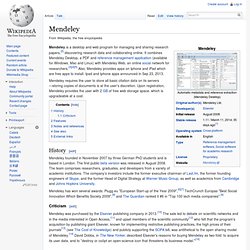
It combines Mendeley Desktop, a PDF and reference management application (available for Windows, Mac and Linux) with Mendeley Web, an online social network for researchers.[3][4][5] Also, Mendeley provides apps on Iphone and iPad which are free apps to install. Ipad and Iphone apps announced in Sep 23, 2013. Mendeley requires the user to store all basic citation data on its servers—storing copies of documents is at the user's discretion. Upon registration, Mendeley provides the user with 2 GB of free web storage space, which is upgradeable at a cost.
History[edit] Mendeley founded in November 2007 by three German PhD students and is based in London. KBibTeX. KBibTeX is a reference management software primarily for BibTeX which is typically used in conjunction with TeX/LaTeX.
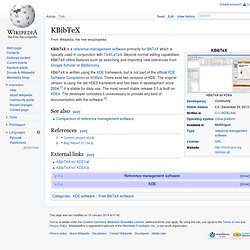
Beyond normal editing capabilities, KBibTeX offers features such as searching and importing new references from Google Scholar or BibSonomy. KBibTeX is written using the KDE framework, but is not part of the official KDE Software Compilation or KOffice. There exist two versions of KDE: The original version is using the old KDE3 framework and has been in development since 2004;[1] it is stable for daily use. The most recent stable release 0.5 is built on KDE4. Jumper 2.0. ApexKB (formerly Jumper 2.0), is an open source web application script for collaborative search and knowledge management powered by a shared enterprise bookmarking engine that is a fork of KnowledgebasePublisher.[1] It was publicly announced on 29 September 2008.[2] A stable version of Jumper (version 2.0.1.1) was publicly released under the GNU General Public License and made available on Sourceforge on 26 March 2009 as a free software download.[3] Jumper is Enterprise 2.0 software that empowers users to compile and share collaborative bookmarks by crowdsourcing their knowledge, experience and insights using knowledge tags.
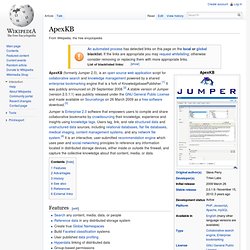
Features[edit] Jumper 2.0 is enterprise web-infrastructure for tagging and linking information resources.[5] Jumper 2.0 lets you search and share high-value content, media, or data across remote locations using knowledge tags to capture knowledge about the information in distributed storage. It collects these tags in a tag profile. JabRef. Features[edit] History[edit] The first version of JabRef was released in 2003 after the creators of BibKeeper (Morten O.

Alver) and JBibtexManager (Nizar Batada) decided to join the two projects. EndNote. EndNote is a commercial reference management software package, used to manage bibliographies and references when writing essays and articles.
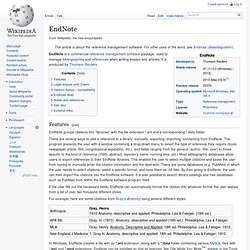
It is produced by Thomson Reuters. Features[edit] EndNote groups citations into "libraries" with the file extension *.enl and a corresponding *.data folder. There are several ways to add a reference to a library: manually, exporting, importing, connecting from EndNote. The program presents the user with a window containing a drop-down menu to select the type of reference they require (book, newspaper article, film, congressional legislation, etc.), and fields ranging from the general (author, title, year) to those specific to the kind of reference (ISBN, abstract, reporter's name, running time, etc.) If the user fills out the necessary fields, EndNote can automatically format the citation into whatever format the user wishes from a list of over two thousand different styles.
Citavi. Citavi is a reference management program for Microsoft Windows published by Swiss Academic Software in Wädenswil, Switzerland.
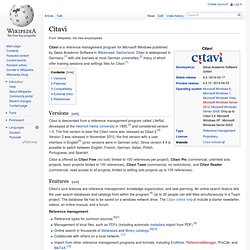
Citavi is widespread in Germany,[1] with site licenses at most German universities,[2] many of which offer training sessions and settings files for Citavi.[1] Versions[edit] Citavi is descended from a reference management program called LiteRat, developed at the Heinrich Heine University in 1995,[3] and considered version 1.0. The first version to bear the Citavi name was released as Citavi 2.[4] Version 3 was released in November 2010, the first version with a user interface in English[5] (prior versions were in German only).
Bebop (software) Bebop (BibTeX Publisher) is a web-based BibTeX front-end that creates a web interface to a list of publications stored in a BibTeX file and allows browsing by author, year, document type, topic and keywords using PHP, Javascript and XML technologies.
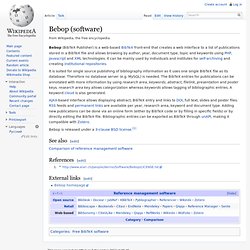
It can be mainly used by individuals and institutes for self-archiving and creating institutional repositories. It is suited for single source publishing of bibliography information as it uses one single BibTeX file as its database. Therefore no database server (e.g. MySQL) is needed. The BibTeX entries for publications can be annotated with more information by using research area, keywords, abstract, filelink, presentation and poster keys. research area key allows categorization whereas keywords allows tagging of bibliographic entries. Zotero. Zotero /zoʊˈtɛroʊ/ is free and open-source reference management software to manage bibliographic data and related research materials (such as PDF files).

Notable features include web browser integration, online syncing, generation of in-text citations, footnotes and bibliographies, as well as integration with the word processors Microsoft Word, LibreOffice, OpenOffice.org Writer and NeoOffice. WizFolio. WizFolio is a web based reference management software for researchers to manage, share their research and academic papers and generate citations in scholarly writings.

It uses plug-ins (HTML parsing technology) to collect bibliographic information, videos and patents[1][2] from webpages. History[edit] Developed by WizPatent Pte Ltd, its alpha version was launched on 12 May 2008, and the beta on 22 June 2008. It has since been released officially and is opened to the general public.[3] During the 8th International Conference on Bioinformatics (InCOB), Lim Chuan Poh, Chairman of Agency for Science, Technology and Research (A*STAR) announced that the Asia-Pacific Bioinformatics Network (APBioNet) and Association for Medical and Bio Informatics Singapore (AMBIS) signed an agreement with WizFolio to provide respective members access to the system as well as explore new ways to improve the process of scientific peer review activities.[4] RefWorks. Functionality and features[edit] Users' reference databases are stored online, allowing them to be accessed and updated from any computer with an internet connection.
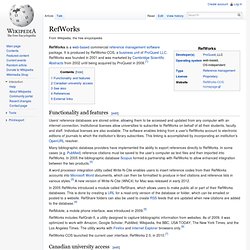
Institutional licenses allow universities to subscribe to RefWorks on behalf of all their students, faculty and staff. Individual licenses are also available. Papers (software) Papers is reference management software for Mac OS X and Windows,[3] used to manage bibliographies and references when writing essays and articles. It is primarily used to organize references and maintain a library of PDF documents and also provides a uniform interface for document repository searches, metadata editing, full screen reading and a variety of ways to import and export documents.
Papers was developed by Alexander Griekspoor and Tom Groothuis while studying towards their Ph.D.s at the Netherlands Cancer Institute.[1] Faced with working with hundreds of digital publications in PDF format, the pair worked on Papers to provide an iTunes-like approach to document management.[1] Papers was originally released as a public preview in February 2007, followed by the full 1.0 version a few months later.
A new version of the software was released and put for sale in the third quarter of 2013, along with a new iPhone/iPad app. Qiqqa. Qiqqa (pronounced "Quicker") is a freeware and freemium reference management software[1][2] that allows researchers to work with thousands of PDFs.[3] It combines PDF reference management tools, a citation manager and a mind map brainstorming tool. It integrates with Microsoft Word XP, 2003, 2007 and 2010 and BibTeX/LaTeX to automatically produce citations and bibliographies in thousands of styles. Researchers and research groups can store, synchronize and collaborate on their PDF documents, annotations, tags and comments using the internet cloud-based Qiqqa Web Libraries.
History[edit] The development of Qiqqa, based in Cambridge, UK, began in December 2009 and was first released as a public alpha in April 2010. The first version offered PDF management and brainstorming capabilities. Home - academic and research PDF management - Qiqqa. Comparison of reference management software. The following tables compare reference management software.